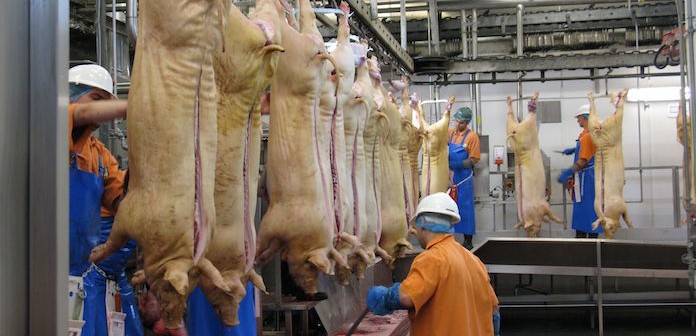The British Meat Processing Association has published a report highlighting the labour issues that the British meat industry is facing, with a list of recommendations for Government to consider for the short, medium and long term.
The report, which was submitted to the Migration Advisory Committee, shows the issues facing the labour-intensive and difficult to automate industry, highlighting the recruitment efforts that have already been undertaken and how firms plan to tackle this in the future.
Key points in the report discusses that while the reliance on overseas labour has come down since 2018, it is still very high with EU workers typically making up over 60% and in some cases over 70% of workforces.
It also shows that until the coronavirus crisis, it has been incredibly difficult to recruit British workers into the meat industry due to a combination of reluctance to take on this type of role and very low unemployment in the areas where plants are located.
Recommendations
The report outlines recommendations for the future of the industry.
Short term recommendations:
- The addition of Butchers onto the Shortage Occupation List to enable the industry to more easily recruit skilled workers from outside of the UK, to help fill the skills gap.
- All future visa requirements and procedures are simple (for both employee and employer) and are processed without delay.
- Visa costs kept low to avoid as much additional cost and resource pressures to businesses as possible.
- The UK Government should work to ensure that all eligible EU workers have registered for settled or pre-settled status, before the deadline.
- Government should support businesses for this upcoming Christmas period in the recruitment and retention of seasonal workers.
Medium/Long term recommendations
- Encourage economically inactive and unemployed British people to apply for positions in the meat industry.
- Increase the visibility of meat industry job vacancies
- Facilitate access to skilled labour in the short term
- Invest in training for the meat industry
- Promoting the meat industry as a viable career choice, in schools and colleges
- Increasing the employability of students leaving schools, particularly by instilling and assessing certain behaviours such as work ethic, team working and responsibility.
- Work with industry and training providers to coordinate supply of training and demand of skilled workers.
- Help to ease the requirements to the apprenticeship levy fund, so it can be accessed more easily by businesses for genuine training needs.
- Address transport infrastructure needs in areas with meat plants, to enable accessible and affordable transport for those working in plants.
- Assistance with the seasonal labour market.
- Government to consider expanding the seasonal agricultural worker visa numbers and expand the scope to include food factory workers.
- A review of the implemented visa process and adjusted if necessary. Industry should be widely consulted on this review.
The report’s author and BMPA’s technical policy manager, Anna Proffitt, said: “While it’s hoped that more UK workers will now be attracted into the profession, there still remain significant challenges to fill skilled positions. Even if more British people step forward for training, there would still be a minimum two year skills gap (the time it takes to train a new recruit) which would need to be filled by fully skilled workers.
“These skilled workers can only come from abroad and that’s why BMPA is calling on the Home Office to include Butchers on the Shortage Occupation List. We also want Government to work with the industry to deliver public outreach to attract more young people as well as those switching career into the industry and provide easier access to the Apprenticeship Levy fund to finance their training.”




